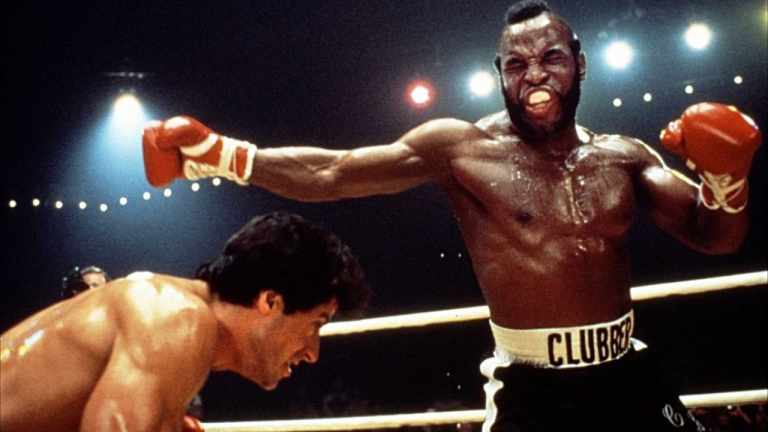Creed III Reinvents the Greatest Rocky Villain
Rocky III might not be the best sequel in the Rocky/Creed universe, but it has the best villain: Clubber Lang. And it seems Mr. T's shadow looms again in the upcoming Creed III...

After a number of years, rumors, and teases, Creed III is finally arriving in theaters. Michael B. Jordan is behind the camera for the threequel, succeeding Ryan Coogler and Steven Caple Jr. in the directorial seat, and the film chronicles Adonis Creed (Jordan) at the height of his powers and going up against his childhood best-friend turned bitter enemy Damien Anderson (the ever magnetic Jonathan Majors). It looks riveting, emotional, and visceral.
And as one watches Creed at this stage of his life, one reflects back on the very man and series that it all emerged from: Rocky. Specifically, Rocky III, which holds a fascinating place in the Rocky canon. It certainly holds its most meaningful villain.
Rocky Before Clubber Lang
The original Rocky was very much a classical underdog story wherein Sylvester Stallone’s southpaw brawler from Philly is a rough working class guy of the streets. He just wants to prove he’s more than some bum; he’s a nobody and he gets a chance of a lifetime, having to prove his mettle against Apollo Creed, the rich and glamorous Heavyweight Champion. Rocky wants to go the distance. And he does.
Stallone sells it in the role, and so does Carl Weathers as Apollo Creed. Then Rocky II arrives, and it’s very much a redo of the first, wherein Rock’s still the underdog struggling for cash, and now he has to face Apollo yet again to prove he’s more than just a one hit wonder. That he’s not just a guy that lucked out one time. That he is worth the stature he’s been afforded. And Rocky does it. He wins. He proves himself.
But neither of these films have a classical “villain.” Apollo Creed is the antagonist in both, yes, but he’s much too charming and lovable to really be a meaningfully villainous figure for Rocky. In the first film, he’s a man who doesn’t take things seriously and is a very chill celebrity. In the second, he’s a petty guy with a bruised ego, but he never feels villainous. He doesn’t really represent or symbolize anything meaningful for Rocky in standing against him either, beyond a generic rich big man for our poor underdog working class hero to tackle. In the end, there’s something too nice, affable, and fundamentally decent about Weathers’ Apollo.
It’s why when we think of Apollo, we don’t think of him in villainous terms. He’s the charismatic rival. The charming ally who Rocky had a back and forth with. And a huge part of that is because of Rocky III.
Rocky Enters Lang’s House of Pain
If the first and second Rocky movies were establishing Rock and playing him as a Cinderella figure, Rocky III is the film that evolves the whole enterprise. Suddenly, Rocky is no longer the underdog. He’s the man on top. He’s the system. He’s the rich super-celebrity and star. He has become what Apollo once was. It’s why the opening montage of the film is all about presenting Rocky as a cultural icon, doing ads, in photos with presidents, and having his own merchandise. He’s no longer the down-on-his-luck working class guy. He has everything he could ever want.
And then comes Clubber Lang, the feisty lone wolf and trash talking warrior of the ring. Played with incredible flair and charisma by the inimitable Mr. T, Lang takes the role of Rocky in the previous movies. Lang is the working class, underdog scrapper who comes from nothing, who has nothing, and just wants exactly what Rocky got from Apollo: a fair shot.
But he is consistently denied by Rocky’s coach Mickey Goldmill, played by the ever-striking Burgess Meredith. In response to this, an enraged Lang accuses Rocky of being a fraud who only fights “setups” and stays on top without any real risk or effort. Rocky is infuriated by the insinuation. But here’s the thing: He’s right.
We find out he’s absolutely correct, as Mickey informs Rocky that he carefully, selectively picked out fights for Rocky, ensuring they’d always be with challengers Rocky could beat handily without risk. Suddenly, the idea of “Rocky has become Apollo” becomes even more charged and crucial, as Rocky realizes what and who he has been all these years.
If the first two Rockys were about Rocky the man, then the third is about the myth of Rocky, and the man desperately reckoning with it and trying to live up to it. It’s so evident that the myth is literally made manifest, as Rock’s likeness becomes a monument above the streets of Philadelphia. And Lang is the man who challenges that myth, who questions it, and unlike any antagonist before or since, he’s completely justified. He’s vindicated by the narrative. He has every right to be angry and infuriated by a guy who had nothing and made his life off getting a shot and then refusing to ever give another guy like him a shot. Instead, knowingly or not, Rocky’s been ducking him to take easy fights with no risk.
Lang does not simply suffer from a bruised ego like Apollo in Rocky II, and nor is he the inhuman death-machine and cyborg that Dolph Lundgren’s Ivan Drago would later prove to be in Rocky IV. No, Lang represents something real and meaningful, which casts a shadow of doubt over Rocky and everything he’s come to represent. Lang has an ethos and a belief system, which neither the cheery Apollo or the grunting Drago do. They have no point to make or prove, they’re just figures for Rocky to beat. But Clubber Lang? He has a point. He’s right. And the narrative is about Rocky realizing it and then having to reckon with that. It’s Rocky having to find synthesis and move forward in a way he has never had to before.
It’s precisely why Apollo Creed is the only man who can help Rocky, as Rocky in the film is very much in the place Apollo once was. They’re the two men who understand one another best. And it’s in this film that our current popular conception of Apollo Creed is born. He’s firmly crystallized as The Rival figure of the series, the lovable, cheery friend and ally to Rocky who challenges him and pushes him to be better. The guy who has his back, and who Rocky will also always have the back of.
The myth of Rocky was hollow, so Rocky and Apollo work to re-construct Rocky to actually live up to the myth, to be the man deserving and worthy of that statue, who can take on Lang and survive. To be the man who in Apollo’s position could do what Apollo couldn’t. It’s why Apollo is crucial.
Rocky III is where Rocky becomes Rocky in the truest, most iconic sense, with the real friendship and bond of Apollo/Rocky, the final hours of Mickey/Rocky, his relationship with Adrian, his dynamic with Burt Young’s Paulie, the amazing “Eye Of The Tiger” song opener, and a proper, meaningful villain who has a point and provides a true challenge to the series. While Rocky IV would prove to be even bigger, and even more ridiculous, wrapped up in a Cold War era fervor with the American Rocky fighting a literal Soviet super-soldier, the real identity of the Rocky as a series is born in the third installment.
Creed Needs His Own Lang
It’s why even the Creed series, which derives from the Rocky series, feels evocative of it. The first Creed film is once again a tale about an underdog amateur given a shot by the guy on top as a gimmick event. It’s a film wherein Adonis fights for his name, to prove he has something. And in Creed II, Adonis must tackle the only figure who could then make him an underdog: Drago and his legacy. Drago, who killed his father, remains the shadow that haunts Adonis’ story and world; the one and final figure left to take on if Adonis is to prove himself and cement a legacy that’s not beneath his father, but alongside him.
And most crucially, as we approach Creed III, we see Adonis at the top of the world, with his dream life. He is now The Man. He’s no longer the underdog, and he’s no longer under the shadow of anyone, not Rocky, not Apollo, or anybody else. The myth of Adonis Creed has surpassed Apollo Creed, the way Rocky Balboa’s did in Rocky III. And that means you need a story that examines and really questions that myth. That was the purpose of Clubber Lang, after all; he triggered self-reflection on the entire journey of our hero, and reflected back a dark mirror of his own roots. Clubber Lang was Rocky if Rocky had no Mickey or Adrian, or Paulie, or anyone else. A Rocky with truly nothing, who grinded his way out of the dirt and got himself on top through sheer force of will.
Which is why Creed III seems to be giving us Jonathan Majors’ Damien Anderson, the childhood best-friend of Adonis, who poses a “what if?” He too casts doubt and now questions the very myth and foundations of Adonis Creed and his existence, and reframes Adonis as the man on top, as opposed to the underdog. Damien is the guy who was in prison for 18 years, who lost everything, his dreams, his life that could have and should have been, and he had no one. He wasn’t the son of a famous boxing icon like Adonis. And with nothing and no one, Damien is the fury and flame that has kept going all this time. Now he’s here to take what he believes to be rightfully his. He’s the guy who had nothing but worked his ass off to change that fact. He wants everything, and he won’t settle. He’s coming for everything.
Damien is a very specific and personal figure for Adonis to deal with, instead of just being another stock legacy kid–another son of a more famous character in the Rockyverse. Instead Damien is in line with the spirit of Clubber Lang, and like Lang, he’s the brand new idea and bitingly personal villain introduced in a threequel to really examine our hero and his entire journey so far.
It’s exciting to see, particularly with Majors in the role, looking more fit and bulked up than ever. And if done well, with Michael B. Jordan talking about his anime influences for the way the fights are shot, and this being the first sports movie filmed on IMAX cameras, it could prove to be the best, most meaningful of the Creed films to date.
And thrilling as it will be for us viewers, it will be hell for Adonis Creed. It won’t be easy for him to get through this. To quote Clubber Lang: Prediction? Pain.
